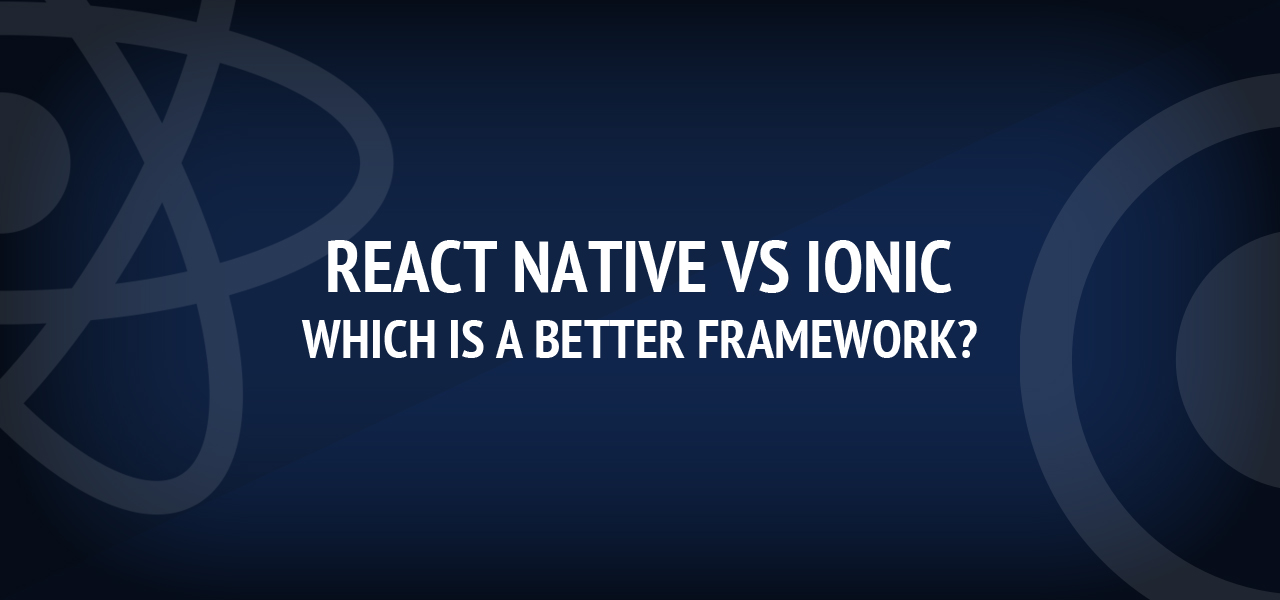Global customers rely Bloomberg Sources to deliver accurate, real-time business and market-moving information that helps them make critical financial decisions please contact
React Native vs Ionic: Which is a Better Framework?

Just as it sometimes makes the developer face the difficult choice between iOS and Android platform for their app, it is equally difficult to choose between React Native and Ionic. This is particularly because both the frameworks are great and leave the little scope of any complaint about building apps keeping both web and native features.
But let us remind you of a very important aspect in this respect. Ionic is more ideal for cross-platform hybrid app development while React Native is mainly focused on building apps for native mobile platforms. While Drifty developed Ionic in 2013, React Native is developed and nurtured by Facebook and was used first in building the iOS app for the social media giant. A React Native development company mainly undertakes ambitious cross-platform projects with a consistent focus on native UI and UX.
Here through the length of this post, we are going to explain the key and defining elements of both the frameworks and their respective pros and cons.
Ionic
Ionic is mainly developed as a framework to build hybrid and cross-platform mobile applications. It is an open source framework which basically uses HTML5 programming language. Just because of its reliance on the HTML5 framework it can also work in collaboration with the mobile-specific frameworks like PhoneGap.
Let us have a look at the key attributes of the Ionic framework.
Compatible with TypeScript 2.1 and 2.2: Typescript is more developer friendly coding language that in spite of carrying all the typical JavaScript code characteristics offers better support for incorporating mixed classes.
IonicPage Decorator: The entire worry about deep link configuration in the root of an app is now gone thanks to Page Decorator. Ionic Page Decorator allows the developers to set up deep links deep inside the app and this helps lazy loading of the app pages.
Lazy Loading: Lazy loading is widely used to keep users engaged by loading the initial view quickly and loading the rest of the app progressively as the user moves on from one page to another. This helps reducing the user dropout and boost engagement. The ionic framework supports lazy loading which speeds up the loading time of the app.
Let us now see the pros and cons of using this framework.
Pros:
- Ionic ensures faster development across platforms.
- It allows building app for both iOS and Android by cross-compiling code.
- The learning curve for Ionic is not steep.
- It allows writing in TypeScript code for all mobile platforms, and this further lowers learning curve for developers having an AngularJS background.
- Ionic allows easy access to native device functions through plugins.
- It perfectly fits smaller mobile app development projects.
Cons:
- The apps with heavy reliance on native code can experience some performance issues.
- Ionic can deliver the same UI look across all devices which is a big turn-off for users expecting different look and feel across devices.
- If you are looking for high-end graphics and sophisticated visual transitions or interactive elements in your app, the Ionic framework can be very limiting.
React Native
React Native is an open source, native UI focused JavaScript library widely popular for building apps with native features. World's most leading apps across niches including Facebook and Google are now using React Native. Instead of building hybrid apps with similar UI for multiple platforms, it allows building native Android and iOS apps by reusing the code. React Native enjoys huge community support from world's leading developers across niches.
Let us see some of the definitive attributes of React Native.
Reusable code: React Native offers a component-based development environment allowing you to reuse the code for deploying the same app on both iOS and Android. This tremendously helps in reducing the cost and development time.
Real-time update with Virtual-Dom: Any changes in the code is reflected and updated in real time thanks to the virtual DOM of the React Native.
Performance: While most other frameworks mainly use the CPU power, React Native architecture uses mostly the GPU to the fullest potential, and this makes it performance driven for mobile apps.
The similar web-ready architecture of React: React Native shares many similarities with the original React architecture. This allows the developer teams to upgrade the web features easily. This helps to sync the mobile and web user experience easily in less time.
Let us now have a look at the pros and cons of the React Native framework.
Pros:
- Reusable coded components of React Native allow developers are building the UI of the web and mobile apps for several platforms easily.
- For large projects, it is an ideal platform just because it strictly follows reliable design patterns and coding paradigms.
- React Native offers completely platform specific native experience and look and feel of the app unlike the “one size fits all” approach of the hybrid apps.
- React Native is more performance driven just because it focuses on each mobile platform singularly.
Cons:
- At times converting the code to the native one shows some fault lines and then you need to learn the native language.
- It is more equipped to deal with iOS than Android. Android development may require building or perfecting some components by the developers.
- React Native is comparatively a complex framework and involves a higher learning curve.
- React Native is not for small-budget apps and typically fits into large cross-platform development projects.
Conclusion
So, in the final analysis, React Native has the edge over the Ionic framework. For fully-fledged mobile app development with emphasis on native functions, you do not have a better framework than React Native. But Ionic may still be lucrative for small-budget development of hybrid apps with fewer demands for native look and feel.
About The Author
Related Blog
View All-
10 Tips to Improve Mobile App User Experience
These days there're trillion-millions of mobile apps available on the app store but more than 70% of them are unsuccessful. Any guesses why? Let me give you a hint on that "The reason is the same for the most of them" Yes, you guessed that right, ...
-
5 Best Android Apps to Make Money
Everybody in this world wants extra money now and then. So as that it is about foolish as trying to make believe that will earn living sitting at home doing nothing there are no apps can make easy money for you. Whether it is about selling clothes at consignment ...







